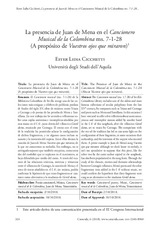Mostrar el registro sencillo del ítem
La presencia de Juan de Mena en el Cancionero Musical de la Colombina ms. 7-1-28 (A propósito de Vuestros ojos que miraron)
| dc.contributor.author | Cicchetti, Ester Lidia | |
| dc.date.accessioned | 2019-02-13T10:42:44Z | |
| dc.date.available | 2019-02-13T10:42:44Z | |
| dc.date.issued | 2018 | |
| dc.identifier.issn | 2340-8960 | |
| dc.identifier.uri | http://hdl.handle.net/10396/17847 | |
| dc.description.abstract | El Cancionero musical (ms. 7-1-28) de la Biblioteca Colombina de Sevilla recoge una de las colecciones más antiguas y célebres de polifonía profana de finales del siglo XV, obra de músicos como Triana y Cornago y de poetas de las prendas de Mena y Santillana. En este trabajo me he atenido a reflexionar sobre unas coplas anónimas e incompletas añadidas por otra mano en el f. 6r, justo detrás del villancico Gentil dama, musicado por Cornago. El cotejo con el resto de la tradición ha permitido aclarar la configuración de dichos fragmentos, y en algunos casos incluso su autoría y la intención del copista. Entre ellos destaca la canción de Juan de Mena Vuestros ojos que miraron, de la que no conocemos su melodía. Sin embargo, no es arriesgado suponer que también esta pieza, como otras dos del cordobés que se copiaron en el cancionero, se haya difundido por medio del canto. A través del examen de las relaciones retóricas, métricas y tématicas entre el villancico de Cornago, la canción de Mena y el resto de textos añadidos en el f. 6r, sin música, podría confirmar la hipótesis de que estos fragmentos se cantaran como alternativa a la mudanza de Gentil dama. | es_ES |
| dc.description.abstract | The Cancionero musical (ms. 1.7.28) of Seville’s Colombina Library includes one of the oldest and most famous collections of secular polyphony from the late XVth century, by composers such as Triana and Cornago and poets such as Mena and Santillana. In this occasion I have ventured to offer a few reflections about some anonymous and incomplete stanzas added by another hand in the f. 6r of this songbook, after the villancico Gentil dama, set to music by Cornago. The comparison with the rest of the tradition has led to cast some light on the configuration of these fragments, in some occasions their authorship, and the intention of the copyist who inserted them. A prime example is Juan de Mena’s song Vuestros ojos que miraron: although we don’t know its melody, it isn’t too speculative to suppose that this piece, like the other two by the same author copied in the songbook, has also been popularized in the sung form. Through the study of the rhetoric, metrics and thematic relationships between Cornago’s villancico, Mena’s poem and the other fragmentary texts added in the f. 6r without music, we could confirm the hypothesis that these fragments were sung as an alternative to the mudanza Gentil dama. | es_ES |
| dc.format.mimetype | application/pdf | es_ES |
| dc.language.iso | spa | es_ES |
| dc.publisher | UCOPress | es_ES |
| dc.rights | https://creativecommons.org/licenses/by-nc-nd/4.0/ | es_ES |
| dc.source | Creneida 6, 324-340 (2018) | es_ES |
| dc.subject | Poesía cancioneril | es_ES |
| dc.subject | Música | es_ES |
| dc.subject | Cancionero musical de la Colombina | es_ES |
| dc.subject | Mena, Juan de, 1411-1456 | es_ES |
| dc.subject | Transmisión | es_ES |
| dc.subject | Cancioneril poetry | es_ES |
| dc.subject | Music | es_ES |
| dc.subject | Cancionero musical de la Colombina | es_ES |
| dc.subject | Transmission | es_ES |
| dc.title | La presencia de Juan de Mena en el Cancionero Musical de la Colombina ms. 7-1-28 (A propósito de Vuestros ojos que miraron) | es_ES |
| dc.title.alternative | The Presence of Juan de Mena in the Cancionero Musical de la Colombina ms. 7-1-28 (About Vuestros ojos que miraron) | es_ES |
| dc.type | info:eu-repo/semantics/article | es_ES |
| dc.relation.publisherversion | http://www.uco.es/servicios/ucopress/ojs/index.php/creneida/index | es_ES |
| dc.rights.accessRights | info:eu-repo/semantics/openAccess | es_ES |

